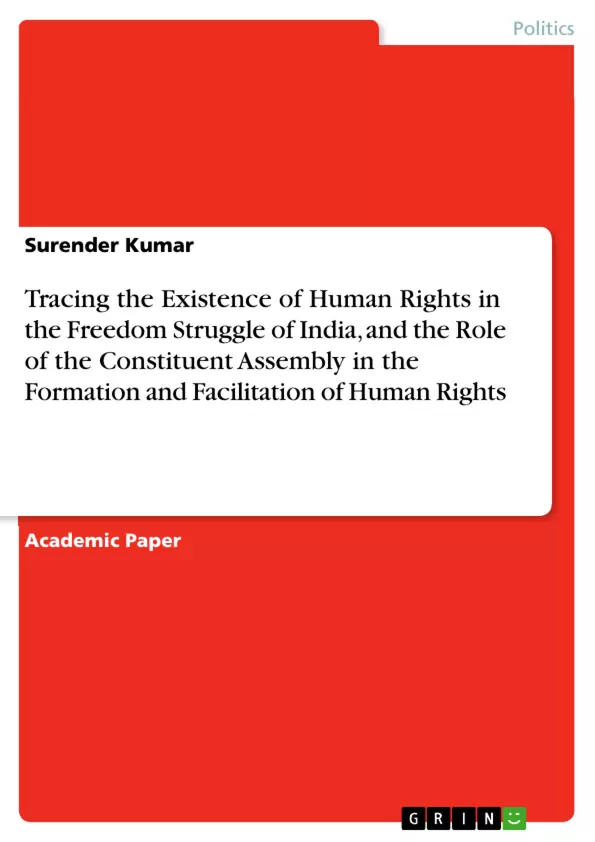During the span and time of freedom struggle in India the concept of inherent rights possessed by every individual found its root. It can be categorically agreed upon that the freedom movement in India was predominantly a struggle for rights to equality, freedom and justice, which were denied to the Indian people in colonial subjectivity. The long struggle for equal rights against colonial rule was marked by slow and piecemeal reforms by the rulers. A tiny section of Indians, primarily the propertied and affluent sections, were given limited political rights viz., of voting and sitting in governing bodies. All Indians were, however, subject to innumerable restrictions on their right to freedom and equality under demeaning conditions of coloni.al rule. The struggle against colonial rule, thus, forms the context in which the language of rights developed. So, the ideas of equality and freedom as primary conditions of dignified human existence were the moving force behind the freedom struggle. And, it led to the setting up of the Constituent: Assembly. The Assembly framed the Constitution of India, which became the source of sovereignty of the people of an independent nation. The rights, which were hitherto denied by colonial rude, became the basic and fundamental rights of the people.
Inhaltsverzeichnis (Table of Contents)
- Tracing the Existence of Human Rights in the Freedom Struggle of India, and the Role of the Constituent Assembly in the Formation and Facilitation of Human Rights
- Historical Flashback of the Demands for Rights in Indian Context
- Constitutional Framework of Rights in India
- The Role of Cabinet Mission Plan and Constituent Assembly
- Objectives Resolution
- Advisory Committee and its Subcommittees
- The Subcommittee on Fundamental Rights
- The Subcommittee on Minority Rights
- The Subcommittee on Tribal and Excluded Areas in Assam
- The Subcommittee on Tribal and Excluded Areas in the North-West Frontier
- The Subcommittee on Excluded and Partially Excluded areas other than Assam and North West Frontier
- Fundamental Rights and the Constituent Assembly
- Structure and Formation of Fundamental Rights
- Equality
- Judicial Backup and Confirmation of Rights
- Socio-Economic Dimension of Rights
Zielsetzung und Themenschwerpunkte (Objectives and Key Themes)
This article delves into the evolution of human rights during India's freedom struggle, focusing on the role of the Constituent Assembly in shaping and securing these rights. The author investigates how the struggle for independence propelled the conceptualization of rights, culminating in their enshrinement in the Indian Constitution.
- The historical development of human rights demands during India's colonial period.
- The establishment of the Constituent Assembly and its role in drafting the Indian Constitution.
- The debate surrounding the inclusion of fundamental rights and their legal enforceability within the Constitution.
- The consideration of both individual and socio-economic rights, including the specific concerns of marginalized communities.
- The impact of the Constituent Assembly's decisions on the legal framework and future development of human rights in India.
Zusammenfassung der Kapitel (Chapter Summaries)
The article begins by establishing the historical context of the freedom struggle in India as a fight for equality, freedom, and justice. It then examines the gradual emergence of demands for rights, highlighting the resistance against colonial rule and its denial of fundamental rights. The author then discusses the crucial role of the Constituent Assembly in framing the Indian Constitution and its commitment to the principles of human rights, as reflected in the Objectives Resolution and the Fundamental Rights.
The article further explores the debate within the Constituent Assembly regarding the formulation of fundamental rights, including the consideration of both positive and negative formulations. It analyzes the debate over the role of the judiciary in safeguarding these rights, leading to the adoption of a system of judicial review.
Furthermore, the article delves into the discussions surrounding the substance of the rights to be guaranteed, focusing on the balance between political and socio-economic rights. It examines the inclusion of Directive Principles of State Policy as a means to address issues like poverty and illiteracy, acknowledging the limitations of legally enforceable rights in certain areas.
Schlüsselwörter (Keywords)
The main keywords and focus topics of the text include: human rights, freedom struggle, India, Constituent Assembly, Indian Constitution, Fundamental Rights, Directive Principles of State Policy, colonial rule, equality, freedom, justice, judicial review, socio-economic rights.
Frequently Asked Questions
How did the freedom struggle in India influence human rights?
The movement was essentially a struggle for equality, freedom, and justice, forming the context in which the language of rights developed against colonial rule.
What was the role of the Constituent Assembly?
The Assembly framed the Constitution of India, transforming denied colonial subjects into citizens with fundamental and basic rights.
What are the "Fundamental Rights" in the Indian Constitution?
They are legally enforceable rights to equality and freedom that were established as the source of sovereignty for the independent nation.
How are socio-economic rights addressed in India?
Through Directive Principles of State Policy, the Assembly aimed to address poverty and illiteracy, balancing political rights with social needs.
What significance did the Objectives Resolution have?
It served as the guiding principle for the Constituent Assembly, outlining the commitment to human rights and dignified existence for all Indians.
- Quote paper
- Surender Kumar (Author), 2018, Tracing the Existence of Human Rights in the Freedom Struggle of India, and the Role of the Constituent Assembly in the Formation and Facilitation of Human Rights, Munich, GRIN Verlag, https://www.grin.com/document/459790



